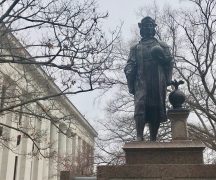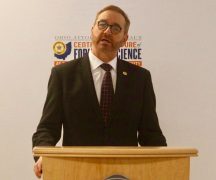By Susan Tebben
The capital bill agreed to in a joint conference committee of the Ohio General Assembly includes a small part of the education overhaul bill that seems to have faded away at the end of the lame duck.
Senate Bill 310 provides federal COVID-19 funding, and also makes capital appropriations, some of those directed at education.
Of the $2.1 billion included in the bill, $3 million from the State Lottery Fund will go to support education studies in fiscal year 2021.
Those studies were originally a part of House Bill 305, a measure to address unconstitutionality in the state’s public school funding system, and develop a funding model that was based on the true costs of education in each of Ohio’s districts. State Rep. Haraz Ghanbari is a co-sponsor.
State Rep. John Patterson, D-Jefferson, led the charge on the bill, which was passed through the House on December 3. The bill was introduced in the Senate on December 8, and referred to the Senate Finance Committee the next day.
The bill never saw a hearing in the Senate, and soon after, both Patterson was hospitalized with pneumonia caused by COVID-19.
“I am delighted to see that the conference committee saw the need to incorporate funding for the studies related to HB 305,” Patterson told the OCJ after the Friday passage. “This work can now begin in earnest to help, in part, guide the school funding reform efforts.”
Sen. Matt Dolan, R-Chagrin Falls, who explained the capital budget bill on the Senate floor on Friday, had already called HB 305 “a great framework to build on during the state’s next budget process” in a statement posted to Twitter.
According to a synopsis of the conference committee agreement, the Ohio Department of Education must complete studies of special education, gifted services, incentives for rural districts serving gifted children, educational service centers, English learners, the cost of e-school learning and the operating community schools. Those studies must be done by Dec. 31, 2022.
By the same deadline, the state’s Office of Budget and Management is tasked with creating “an inventory of all state budget line items that, in its determination, provide funding for services to children,” according to the committee synopsis.
Also created as part of the bill is a joint legislative task force to study transportation of community schools and nonpublic school students and “to determine methods to create greater efficiency and minimize costs in transporting them.”
That task force has until the end of the year in 2022 to report its findings and “a recommendation for a funding formula for transportation.”
The details included in the bill were also in the senate’s version of the education overhaul bill, but that measure did not make it through the Senate, making it impossible to get to the House for approval before the end of the year.
As for the future of the rest of the education overhaul, Dolan said the cost of the overhaul is the most significant issue to be resolved in the new General Assembly. He gave a funding commitment of June 30, 2021 to have a funding formula in place when the budget passes.
“There are many features I like about this formula,” Dolan wrote. “One is having the state, instead of the school district, directly pay for EdChoice vouchers, community and charter school students.”
One small change was made to the EdChoice private school voucher program in the capital budget bill, opening the priority application period for the 2021-2022 school year on March 2, 2021, instead of the previous February timeline.
The March deadline was included in Senate Bill 89, passed at the end of November, but that bill did not include an emergency clause, which would have waived the 90-day waiting period typical after bills are signed by the governor.





